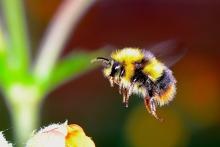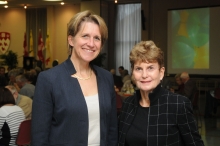Nature supports people in critical ways, often at a highly local level. A wild bee buzzes through a farm, pollinating vegetables as it goes. Nearby, wetlands remove chemicals from the farm’s runoff, protecting a community drinking water source. In communities all around the world, nature’s contributions are constantly flowing to people. A team of international scientists including from McGill University, have mapped these contributions at local levels for years, but a new Stanford-led study closes a critical gap in how this information can be used to drive global policy and development.

THE GLOBE AND MAIL | The loss of three billion birds in North America is the canary in the coal mine
David M. Bird is an emeritus professor of wildlife biology at McGill University who has studied birds for five decades. "When I read the recent headlines that North America has lost nearly three billion birds over just the past five decades, I was not surprised. But I must admit it did depress me to a degree. That’s a lot of birds!"

Two McGill researchers developing solutions to clean marine oil spills in the Northwest Passage and in oceans surrounding Canada to receive $3.7 million in funding from the Multi-Partner Research Initiative (MPRI).
Today, the Honourable David Lametti, Minister of Justice, Attorney General of Canada and Member of Parliament for LaSalle-Émard-Verdun, announced on behalf of the Honourable Jonathan Wilkinson, Minister of Fisheries, Oceans and the Canadian Coast Guard, that McGill University will receive more than $3.7 million for two research projects that will help minimize the environmental impact of oil spills. Minister Lametti also announced funding for two research projects led by Concordia University. Together, this investment will top $8.2 million and support 19 scientific trainee positions.


New research from McGill University reveals an overlooked impact that the widely used herbicide glyphosate may be having on the environment.
First commercialized by Monsanto under the name Roundup, glyphosate has come under scrutiny in the past, mostly in relation to its potential toxicity. This new research, published recently in the Ecological Society of America’s Frontiers in Ecology and the Environment, focuses not on direct health risks associated with the herbicide, but on its contribution to environmental phosphorus levels, an issue that has yet to receive much attention.

The Lancet commission on Obesity published a report today on the joint pandemics of obesity, undernutrition, and climate change. In the report, the commissioners point to the fact that malnutrition in all its forms, including undernutrition and obesity, is by far the biggest cause of ill-health and premature death globally. Excess body weight affects 2 billion people worldwide, 2 billion people suffer from micronutrient deficiency, and both are expected to be made significantly worse by climate change.

Every night, some 800 million people – one in nine people on earth – go to bed hungry. And projections suggest that unless creative solutions are found, the world will need to increase food production by an additional 50% in the next 30 years, when the planet’s population is expected to exceed 9 billion.

McGill University to partner with Xebec to develop Power-to Gas process for renewable energy storage
McGill University today announces it will co-develop with Xebec Adsorption Inc. (TSXV: XBC) a prototype reactor to produce Renewable Natural Gas (RNG) using the Power-to-Gas (P2G) process which combines electricity generated by renewable sources and CO2 generated from waste. The project is being partially funded by a Collaborative Research and Development grant from the Natural Sciences and Engineering Research Council of Canada (NSERC). The value of the grant is $360,000 for a period of three years.

McGill University chemistry professor Matthew Harrington is aiming to develop a renewable alternative to petrochemical plastics by mimicking the astonishing chemistry of the velvet worm – a creature that has made a name for itself through its projectile slime.
Inhabiting the forest floors of Australia and South America, velvet worms catch their prey by shooting out a jet of liquid that rapidly thickens to a sticky gel before hardening into polymer fibres comparable in stiffness to nylon.

How healthy is your almond milk really? It may taste good and may not cause you any of the unpleasant reactions caused by cow’s milk. But though plant-based milk beverages of this kind have been on the market for a couple of decades and are advertised as being healthy and wholesome for those who are lactose-intolerant, little research has been done to compare the benefits and drawbacks of the various kinds of plant-based milk.

McGill University is committing to achieve carbon neutrality by 2040, under its new Climate & Sustainability Action Plan (2017-2020), released today.

Montreal, with its multilingual, multiethnic population, is an ideal living laboratory for researchers and students from the city’s four universities and many specialized research centres. How can Montreal be designed to better accommodate the needs of its children? What measures need to be put in place to accommodate people of different cultures and religions living in close proximity? How is the city’s nighttime economy different from that of the daytime and what are the implications?


Too much fear can be dangerous for species’ survival. In fact, fear alone, even in the absence of a live predator, can lead to species’ extinction if the population size is small enough suggests a recent study from McGill and Guelph universities. To read: “How fear alone can cause animal extinction”
